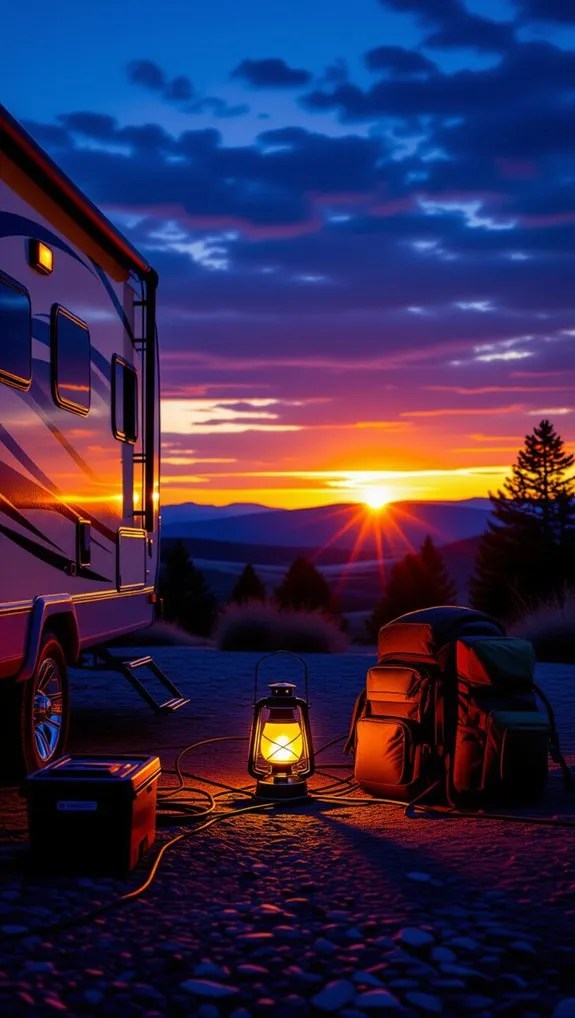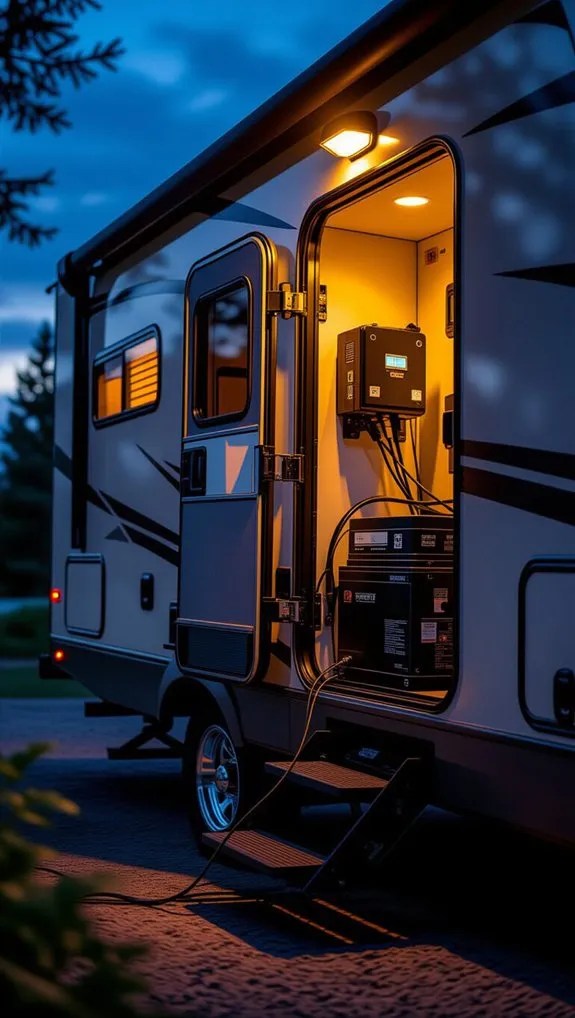You’ve probably asked yourself, “Do I need a battery if my RV is plugged in?” It’s one of those questions that seems simple on the surface but has a more complex answer than you might expect. Many RV owners assume that shore power eliminates the need for their battery, but that’s not quite the whole story.
Your RV battery plays several crucial roles even when you’re connected to electrical hookups. It acts as a voltage stabilizer, keeps your 12V systems running during brief power interruptions, and provides the extra juice needed for high-demand operations like extending slides or leveling jacks.
In this post, we’ll break down exactly why your battery remains essential even with shore power, explore what could go wrong if you disconnect it, and help you understand how your RV’s electrical system really works when plugged in.
Do I need a battery if my RV is plugged in?

While you might assume an RV battery becomes unnecessary when plugged into shore power, the reality is more nuanced.
Your converter will supply regulated 12 VDC to run most 12V circuits, keeping lights and fans operational. However, high-current devices like slide-out motors might still require battery support for surge power.
The battery also provides crucial backup during brief shore power interruptions.
Even when connected to shore power, maintaining your RV battery can prevent unexpected system failures and ensure consistent electrical performance across your vehicle’s essential systems.
What shore power runs without a battery
Because shore power offers robust electrical capabilities, many RV systems can operate seamlessly without a battery connected.
When plugged in, you’ll find several key systems running smoothly:
- 120VAC appliances like microwaves and air conditioners work directly from shore power
- RV converter powers 12V accessories when battery disconnect switch is ON
- Most electrical outlets function normally
- Control boards and basic electrical systems remain operational
However, your converter’s capacity matters.
If shore power is heavily loaded, some 12V systems might experience reduced performance.
Always monitor your electrical draw to ensure consistent power management across your RV’s systems.
Will my RV systems work on shore?

Wondering if your RV systems will function smoothly when plugged into shore power? Most 12V circuits like lights, fans, and water pumps will work fine through the converter/charger. However, some high-current devices might still need your RV battery for surge power.
| System | Shore Power | Battery Needed |
|---|---|---|
| Lights | Yes | No |
| Slide-outs | Partial | Yes |
| Water Pump | Yes | No |
Your converter will charge the battery if the disconnect switch is ON and sufficient power exists. Just remember that legal systems like breakaway switches might require a connected battery for safety functions, even when you’re plugged in.
Can I disconnect battery while plugged in?
RV owners can typically disconnect their battery while plugged into shore power, but it’s not always straightforward. Your converter/charger might handle 12V loads differently depending on your specific setup.
- Verify your battery disconnect switch is in the correct position
- Check if your converter can supply power without battery connection
- Understand potential limitations for high-draw appliances
- Consult your RV’s owner manual for specific guidance
When shore power is stable, you can often disconnect the battery safely. However, some systems require battery connection for proper electronics protection and charging. Always prioritize your specific RV’s manufacturer recommendations to prevent potential electrical complications.
Risks of camping without house battery

While many RV owners might assume shore power alone suffices, camping without a house battery introduces significant electrical vulnerabilities that can compromise your entire system’s functionality.
Critical systems like slide-outs, leveling jacks, and safety switches rely on battery power. Your converter can’t instantly handle sudden power shifts, risking dangerous resets for refrigerators and control boards.
Without a battery, voltage fluctuations can damage sensitive electronics, and parasitic draws might cause nuisance fuse trips. Even worse, you’ll lose crucial backup power during unexpected shore power interruptions, leaving your RV’s electrical ecosystem exposed and potentially nonfunctional.
How to safely use RV without battery
When using shore power without a house battery, I recommend starting with a thorough shore power check to ensure stable electrical connections and converter functionality.
My safety approach involves flipping the battery disconnect switch to prevent potential short circuits and reduce theft risks.
I’ll also monitor converter temperature and electrical system status closely to catch any unexpected issues during extended plug-in periods.
Shore power check
In the world of RV power management, shore power can be a lifeline for your electrical systems.
When checking shore power without a battery, keep these key points in mind:
- Verify your converter can supply 12V power without a battery
- Check that high-current devices function properly on shore power
- Monitor voltage levels and breaker status during AC load usage
- Ensure proper battery maintenance during long-term storage
Carefully test all electrical systems before relying solely on shore power.
Some converters might struggle with limited power services or heavy electrical loads.
Always confirm your specific RV’s capabilities and have a backup plan to prevent unexpected power interruptions.
Disconnect switch
Navigating the intricacies of RV power management boils down to grasping your battery disconnect switch—a critical component that can make or break your electrical system’s reliability. This switch controls power flow between your battery and shore power, ensuring safe electrical operation.
| Switch Position | Battery Status | Converter Function | Recommended Use |
|---|---|---|---|
| ON | Connected | Charging | Shore Power |
| OFF | Isolated | Disabled | Storage |
| OFF | Removed | N/A | Maintenance |
| Taped/Insulated | Disconnected | Blocked | Safety |
When plugged into shore power, keep the disconnect switch ON to maintain battery float charge and provide power stability for essential RV systems.
Safety monitors
After grasping how the battery disconnect switch manages power flow, safety becomes the next critical consideration for RV electrical systems. Keeping your safety monitors operational is crucial, even when plugged into shore power.
- Smoke detectors require functional batteries to work during power interruptions
- The converter must maintain a steady 12V supply for safety circuits
- Breakaway switch legally needs a charged battery to activate trailer brakes
- Internal battery backups ensure continuous monitoring of critical systems
Spot-checking your electrical system with a multimeter helps verify proper grounding and converter output, ensuring your RV’s safety devices remain fully functional and ready to protect you.
Battery benefits even when on hookups
Power surges and electrical hiccups can be a silent threat to RV systems, but your trusty battery serves as a hidden guardian even when you’re plugged into shore power. Your RV battery provides critical benefits beyond just backup power.
| Benefit | Function |
|---|---|
| Surge Protection | Smooths electrical fluctuations |
| Load Handling | Supports high-current devices |
| Backup Systems | Powers safety controls |
| Voltage Stabilization | Reduces electrical noise |
| Continuous Readiness | Maintains charge for emergencies |
Modern converter/chargers keep your battery ready, floating it at around 13.4V while connected. This ensures you’re prepared for unexpected power interruptions and maintains your RV’s electrical system integrity.
Choosing the right battery for hookups

Since your battery plays a protective role during shore power connections, selecting the right battery becomes a strategic decision for your RV’s electrical ecosystem.
When choosing an RV battery for hookups, consider these key factors:
- Deep-cycle lead-acid or AGM batteries work well for regular shore power use
- Match battery voltage and capacity to your specific RV requirements
- Prioritize batteries with good float tolerance and compatibility
- Consider weight, installation space, and long-term cost implications
Your shore power battery isn’t just a backup—it’s a critical component ensuring smooth electrical performance and protecting your RV’s systems during stationary periods.
Troubleshooting no power while plugged in
When electrical issues knock out your RV’s power, don’t panic—troubleshooting can quickly pinpoint the problem.
Start by checking the shore power cord, pedestal breaker, and RV breaker. A damaged 30A cord or tripped breaker often causes power failures.
Verify your converter’s functionality by measuring ~13–14.5V DC on the 12V bus when connected.
Check the battery disconnect switch and inline fuse, ensuring they’re engaged.
If 12V loads only work with a battery connected, suspect converter issues or a disabled battery connection.
Inspect ground connections and look for any obvious wiring repairs that might interrupt power.
Maintenance tips to avoid battery downtime

After wrestling with electrical gremlins that can disrupt your RV’s power, protecting your battery becomes your next mission. Keeping your RV battery healthy while plugged into shore power requires strategic maintenance:
- Use a battery disconnect switch to prevent parasitic drains
- Install a small maintenance solar panel (10-30W) to top off batteries
- Check battery voltage weekly, maintaining at least 50% charge
- Employ a multi-stage smart charger with proper float mode
These tactics ensure your battery remains reliable, preventing unexpected downtime and preserving your RV’s electrical system during storage or long periods of inactivity.
Frequently Asked Questions
Will RV Power Work Without a Battery?
Yes, I can power most RV systems when plugged into shore power, but some high-draw devices might not work correctly. I’ll want to keep a battery connected for reliable operation and as a backup power source.
Should You Disconnect the RV Battery When Plugged In?
I recommend keeping the battery connected while on shore power, as it helps maintain proper charging and provides a buffer for high-current devices. Only disconnect for long-term storage or if you suspect charger issues.
Do RV Batteries Charge When Plugged In?
Yes, my RV battery charges when plugged into shore power. The converter/charger uses 120 VAC to produce 12 VDC and charge the battery, though heavy appliance use can slow or prevent charging.
Is It Okay to Leave RV Plugged in All the Time?
Yes, it’s okay to leave your RV plugged in continuously if you’ve got a modern smart charger. Just monitor your battery’s voltage and health periodically to prevent overcharging and ensure proper maintenance.
In Conclusion
After exploring this topic thoroughly, the answer to “Do I need a battery if my RV is plugged in?” is a resounding yes. Your RV battery serves as more than just backup power—it’s an integral part of your electrical system that stabilizes voltage, protects sensitive electronics, and ensures seamless operation of essential appliances like your refrigerator, even when shore power fluctuates.
Think of your RV battery as an insurance policy for your adventures. It bridges power gaps, prevents damage from electrical surges, and keeps critical systems running smoothly. This protection becomes especially important for power-hungry appliances that need consistent electricity to function properly.
If you’re looking to upgrade your RV setup with reliable appliances that work efficiently with your battery system, check out our comprehensive RV refrigerator reviews to explore smart, well-reviewed options that maximize both performance and energy efficiency for your travels.

